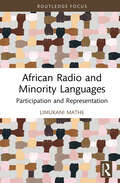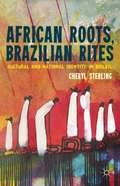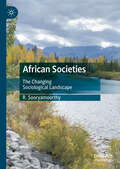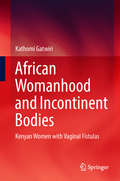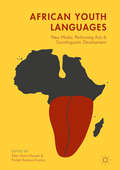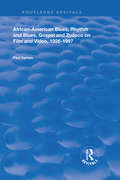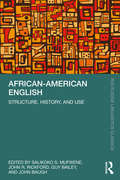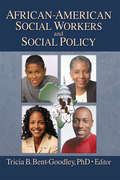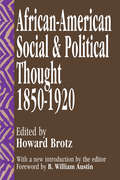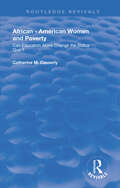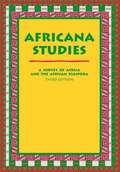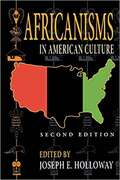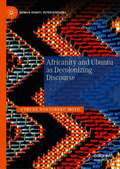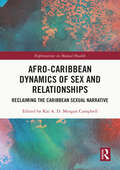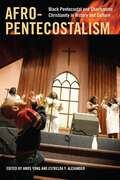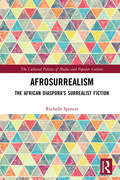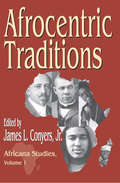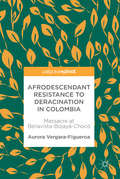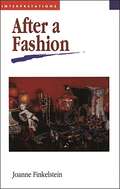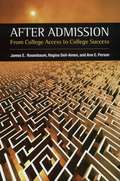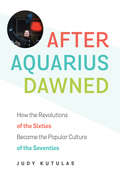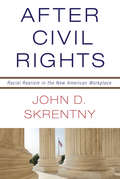- Table View
- List View
African Radio and Minority Languages: Participation and Representation (Routledge African Media, Culture and Communication Studies)
by Limukani MatheWithin Africa, radio provides an important platform for accommodating diverse linguistic groups and enabling speakers to express themselves in their own local languages. This book investigates how radio broadcasting across the continent provides a platform for cultural participation and the representation of minority language speakers in a contested public sphere. In African media, a fierce contest wages for representation and participation, in which majority languages often emerge at the exclusion of minority ethnolinguistic groups. This book considers the important role that radio can play in broadcasting in minority languages. Drawing on in-depth original analysis, ethnographic observation and interviews with minority language radio hosts and guests from across South Africa, Zimbabwe, Nigeria, Malawi, Namibia, Mozambique, Lesotho and Kenya, this book considers to what extent African radio is accommodative of minority languages and what the challenges and prospects are for this. Ultimately, the book argues that radio’s three-tier system of broadcasting through analogue and digital radio leaves the medium of radio particularly well placed to provide equal access for ethnolinguistic groups in Africa.This ambitious and broad-ranging study will be an essential read for scholars and students of media studies and sociolinguistics in Africa.
African Roots, Brazilian Rites
by Cheryl SterlingThis text explores how Afro-Brazilians define their Africanness through Candomblé and Quilombo models, and construct paradigms of blackness with influences from US-based perspectives, through the vectors of public rituals, carnival, drama, poetry, and hip hop.
African Societies: The Changing Sociological Landscape
by R. SooryamoorthyThis book addresses a notable gap in African sociological knowledge by leveraging extensive empirical data covering all 54 African countries and drawing on historical insights from across the continent. Offering a nuanced understanding of African society, it signifies an unprecedented endeavour committed to unravelling the intricate tapestry of African society. The analysis presented in the book goes into the dynamic evolution of sociological topics, their interconnections with African knowledge, the identification of contemporary themes, methodological diversity, and contemporary challenges and issues of indigenisation, decolonisation, and promoting an Africa-centered sociology.
African Studies: Political Thought and the Public Sphere in Tanzania
by Emma HunterPolitical Thought and the Public Sphere in Tanzania is a study of the interplay of vernacular and global languages of politics in the era of decolonization in Africa. Decolonization is often understood as a moment when Western forms of political order were imposed on non-Western societies, but this book draws attention instead to debates over universal questions about the nature of politics, concept of freedom and the meaning of citizenship. These debates generated political narratives that were formed in dialogue with both global discourses and local political arguments. The United Nations Trusteeship Territory of Tanganyika, now mainland Tanzania, serves as a compelling example of these processes. Starting in 1945 and culminating with the Arusha Declaration of 1967, Emma Hunter explores political argument in Tanzania's public sphere to show how political narratives succeeded when they managed to combine promises of freedom with new forms of belonging at local and national level.
African Womanhood and Incontinent Bodies: Kenyan Women with Vaginal Fistulas
by Kathomi GatwiriThis book reveals the structures of poverty, power, patriarchy and imperialistic health policies that underpin what the World Health Organization calls the “hidden disease” of vaginal fistulas in Africa. By employing critical feminist and post-colonial perspectives, it shows how “leaking black female bodies” are constructed, ranked, stratified and marginalised in global maternal health care, and explains why women in Africa are at risk of developing vaginal fistulas and then having adequate treatment delayed or denied. Drawing on face-to-face, in-depth interviews with 30 Kenyan women, it paints a rare social portrait of the heartbreaking challenges for Kenyan women living with this most profound gender-related health issue – an experience of shame, taboo and abjection with severe implications for women’s wellbeing, health and sexuality. In absolutely groundbreaking depth, this book shows why research on vaginal fistulas must incorporate feminist understandings of bodily experience to inform future practices and knowledge.
African Women: Three Generations
by Mark Mathabane"This gripping saga by the author of Kaffir Boy presents a truthful, passionate, and illuminative biography of his great-grandmother, grandmother, and mother in South Africa. Mathabane vividly describes the shocking, heartbreaking stories of each generation of women as they struggle for independent incomes to support themselves and their children; while resisting apartheid, they must also resist the traditions imposed by their own society and the oppresion imposed by their men. The stories are an inspiration and tribute to millions of women worldwide in similar conditions. A thought-provoking book that is sure to deliver a strong message all who read it."--From Libary Journal
African Youth Languages: New Media, Performing Arts And Sociolinguistic Development
by Ellen Hurst-Harosh Fridah Kanana ErastusThis book showcases current research on language in new media, the performing arts and music in Africa, emphasising the role that youth play in language change and development. The authors demonstrate how the efforts of young people to throw off old colonial languages and create new local ones has become a site of language creativity. <P><P>Analysing the language of ‘new media’, including social media, print media and new media technologies, and of creative arts such as performance poetry, hip-hop and rap, they use empirical research from such diverse countries as Cameroon, Nigeria, Kenya, the Ivory Coast and South Africa. <P>This original edited collection will appeal to students and scholars of African sociolinguistics, particularly in the light of the rapidly changing globalized context in which we live.
African-American Blues, Rhythm and Blues, Gospel and Zydeco on Film and Video, 1924-1997 (Routledge Revivals)
by Paul VernonFirst published in 1999, the main part of this reference consists of an alphabetical listing of many hundreds of artists, with details on band personnel, instrumentation, location, titles performed, sources, and other relevant notes included in each listing.
African-American English: Structure, History, and Use (Routledge Linguistics Classics)
by Salikoko S. MufweneThis book was the first to provide a comprehensive survey of linguistic research into African-American English and is widely recognised as a classic in the field. It covers both the main linguistic features, in particular the grammar, phonology, and lexicon as well as the sociological, political and educational issues connected with African-American English. The editors have played key roles in the development of African-American English and Black Linguistics as overlapping academic fields of study. Along with other leading figures, notably Geneva Smitherman, William Labov and Walt Wolfram, they provide an authoritative diverse guide to these vitally important subject areas. Drawing on key moments of cultural significance from the Ebonics controversy to the rap of Ice-T, the contributors cover the state of the art in scholarship on African-American English, and actively dispel misconceptions, address new questions and explore new approaches. This classic edition has a new foreword by Sonja Lanehart, setting the book in context and celebrating its influence. This is an essential text for courses on African-American English, key reading for Varieties of English and World Englishes modules and an important reference for students of linguistics, black studies and anthropology at both undergraduate and postgraduate level.
African-American Social Workers and Social Policy
by Carlton Munson Tricia Bent-GoodleyCritical analyses of policies that significantly affect African-American families and communities! African-American Social Workers and Social Policy is the first book of its kind to combine the voices of African-American social work professionals on social policy in one volume. You'll learn about the impact of health, child welfare, and aging, the implications of welfare reform, and the harsh statistics about race and imprisonment from respected practitioners in the field. Each chapter ends with recommendations for policy advocacy, giving you the tools you need to help reform the system. The issues addressed in African-American Social Workers and Social Policy include: how proposed Social Security reforms can help or hinder efforts to bridge the wealth gap the role of grandparents as caregivers the implications of child welfare policies, including the Multi-Ethnic Placement Act of 1994 the effects of race, class, and gender discrimination on African-American women's health the significance of the Human Genome Project how social workers can stand up to the biases of the criminal justice system African-American Social Workers and Social Policy also presents an eye-opening review of the history of mental health policies for African Americans and an action agenda focused on knowledge and empowerment as a solution to pervasive institutional racism. This book is a welcome forum for policy educators, advocates, and those committed to social justice. You will value African-American Social Workers and Social Policy for its clear identification of issues, thorough analysis of the social policy arena and its impact, and comprehensive description of new goals, directions, and possibilities. This book will help you better understand vital social policies that affect African Americans today.
African-American Social and Political Thought: 1850-1920
by Howard Brotz B.William AustinIn bringing together the most characteristic and serious writings by black scholars, authors, journalists, and educators from the years that preceded the modem civil rights movement, 'African-American Social and Political Thought' provides a comprehensive guide to the range and diversity of black thought. The volume offers a deep history of how the terms of contemporary debate over the future of black Americans were formed. The writings assembled here reveal a tension and a thread between two essential poles of thought. These include those voices that clearly projected civic assimilation as the goal of black aspiration, and those who described how this aim would be achieved, as well as nationalist or separatist voices that despaired of ever having a dignified future in a biracial society. These two positions reflect the most fundamental questions faced by any minority group. In his forceful and courageous introduction to this new edition, Howard Brotz relates the thoughts and reflections of these black thinkers to the social and political situation of blacks in America today and argues against the political orthodoxy and sociological determinism that perpetuates the image of the black as a perennial and passive victim. In the scope and quality of its contents, African-American Social and Political Thought is a unique, invaluable source book for cultural historians, sociologists, and students of black history.
African-American Women and Poverty: Can Education Alone Change the Status Quo?
by Catherine M. CasserlyIn the United States, public policies designed to reduce poverty are overwhelmingly influenced by human capital theory, since education is viewed as the powerful mechanism by which productivity will increase, incomes will be raised, and economic opportunity will be provided. Although African-American women followed the prescription set forth by human capital theory and increased their educational attainment by over 2 years from the late 1960s to the late 1980s, their incidence of poverty remained fairly stable. First published in 1998, this study examines why educational investments by that population most susceptible to being poor, African- American females, have not reduced poverty as expected.
Africana Studies: A Survey Of Africa And The African Diaspora
by Mario AzevedoThe third edition of Africana Studies: A Survey of Africa and the African Diaspora is an update of the second edition (1998) and incorporates new chapters that include expanded coverage of issues on women, health, terrorism, the African Union, and many others, as well as the most recent theories and methods in Africana studies. To date, Africana Studies remains the most comprehensive and most suitable text for both teachers and students interested in Africa and the Diaspora in the US, the Caribbean, Afro-Latin-America, and elsewhere. The book is divided into five parts: the state of the art of Africana studies; the evolution of the history of black people; analysis of the contributions of the black world; the present and future status of these peoples; and the societies and values of black people. The book also includes a chronology of significant events in the history of peoples of African descent and a number of maps.
Africanisms In American Culture, Second Edition
by Molefi Kete Asante Portia K. Maultsby Robert L. Hall Margaret Washington Joseph E. Holloway Selase W. Williams George Brandon Jessie Ruth Gaston John Edwards Philip Robert Farris ThomsonAn important work in the field of diaspora studies for the past decade, this collection has inspired scholars and others to explore a trail blazed originally by Melville J. Herskovits, the father of New World African studies. Since its original publication, the field has changed considerably. Africanism has been explored in its broader dimensions, particularly in the area of white Africanisms. Thus, the new edition has been revised and expanded. Joseph E. Holloway has written three essays for the new volume. The first uses a transnational framework to examine how African cultural survivals have changed over time and readapted to diasporic conditions while experiencing slavery, forced labor, and racial discrimination. The second essay is "Africanisms in African American Names in the United States." The third reconstructs Gullah history, citing numerous Africanisms not previously identified by others. In addition, "The African Heritage of White America" by John Phillips has been revised to take note of many more instances of African cultural survivals in white America and to present a new synthesis of approaches.
Africanity and Ubuntu as Decolonizing Discourse (Human Rights Interventions)
by Otrude Nontobeko MoyoThis book explores and discusses emerging perspectives of Ubuntu from the vantage point of “ordinary” people and connects it to human rights and decolonizing discourses. It engages a decolonizing perspective in writing about Ubuntu as an indigenous concept. The fore grounding argument is that one’s positionality speaks to particular interests that may continue to sustain oppressions instead of confronting and dismantling them. Therefore, a decolonial approach to writing indigenous experiences begins with transparency about the researcher’s own positionality. The emerging perspectives of this volume are contextual, highlighting the need for a critical reading for emerging, transformative and alternative visions in human relations and social structures.
Afro-Caribbean Dynamics of Sex and Relationships: Reclaiming the Caribbean Sexual Narrative (Explorations in Mental Health)
by Morgan Campbell, Kai A. D.Afro-Caribbean Dynamics of Sex and Relationships: Reclaiming the Caribbean Sexual Narrative examines the complexities of sexuality and relationships in the Caribbean, shaped by colonial legacies, cultural norms, and evolving gender roles.Through seven original research studies, it explores a wide range of topics related to sexuality and intimate relationships, including body image and sexual satisfaction, sexual socialization and communication, perceptions of unconventional relationships, the psychological impact of adverse childhood experiences on intimate relationships, family structure’s influence on sexual identity, sexual decision-making among Caribbean youth, and the intersections of mental health, trauma, and intimacy. This book challenges Eurocentric narratives, offering a culturally grounded framework for understanding Afro-Caribbean sexuality.Bridging psychology, sociology, and history, it is essential reading for scholars, researchers, and academics in gender, sexuality, Caribbean studies, and postcolonial mental health.
Afro-Pentecostalism: Black Pentecostal and Charismatic Christianity in History and Culture (Religion, Race, and Ethnicity #16)
by Amos Yong Estrelda Y AlexanderThis &“well researched, illuminating, and highly informative" volume presents a comprehensive, scholarly overview of Black Pentecostal and Charismatic Christianity (Choice). Since the American Pentecostal movement began in the early twentieth century, its African American sector has been markedly influential. Black Christians have been integrally involved in every aspect of the Pentecostal movement, making significant contributions to its founding as well as the evolution of Pentecostal/charismatic styles of worship, preaching, music, engagement of social issues, and theology. Yet despite its being one of the fastest growing segments of the Black Church, Afro-Pentecostalism has not received the kind of critical attention it deserves. Afro-Pentecostalism brings together fourteen interdisciplinary scholars to examine different facets of the movement, including its early history, issues of gender, relations with other black denominations, intersections with popular culture, and missionary activities, as well as the movement&’s distinctive theology. Bolstered by editorial introductions to each section, the chapters reflect on the state of the movement, chart its trajectories, discuss pertinent issues, and anticipate future developments. Contributors: Estrelda Y. Alexander, Valerie C. Cooper, David D. Daniels III, Louis B. Gallien, Jr., Clarence E. Hardy III, Dale T. Irvin, Ogbu U. Kalu, Leonard Lovett, Cecil M. Robeck, Jr., Cheryl J. Sanders, Craig Scandrett-Leatherman, William C. Turner, Jr., Frederick L. Ware, and Amos Yong
AfroSurrealism: The African Diaspora's Surrealist Fiction (The Cultural Politics of Media and Popular Culture)
by Rochelle SpencerExamining the surrealist novels of several contemporary writers including Edwidge Danticat, Tananarive Due, Nalo Hopkinson, Junot Díaz, Helen Oyeyemi, and Colson Whitehead, AfroSurrealism, the first book-length exploration of AfroSurreal fiction, argues that we have entered a new and exciting era of the black novel, one that is more invested than ever before in the cross sections of science, technology, history, folklore, and myth. Building on traditional surrealist scholarship and black studies criticism, the author contends that as technology has become ubiquitous, the ways in which writers write has changed; writers are producing more surrealist texts to represent the psychological challenges that have arisen during an era of rapid social and technological transitions. For black writers, this has meant not only a return to Surrealism, but also a complete restructuring in the way that both past and present are conceived, as technology, rather than being a means for demeaning and brutalizing a black labor force, has become an empowering means of sharing information. Presenting analyses of contemporary AfroSurreal fiction, this volume examines the ways in which contemporary writers grapple with the psychology underlying this futuristic technology, presenting a cautiously optimistic view of the future, together with a hope for better understanding of the past. As such, it will appeal to scholars of cultural, media and literary studies with interests in the contemporary novel, Surrealism, and black fiction.
Afrocentric Traditions
by James L. Conyers Jr.Ever since the first contacts between Europe and Africa, African people have operated from the fringes of Eurocentric experience in the Western mind. Much of what we have studied in African history and culture, or literature and linguistics, or politics and economics, has been orchestrated from the standpoint of Europe's interests. Whether it is a matter of economics, history, politics, geographical concepts, or art, Africans have been seen as peripheral. This volume reviews the past in order to evaluate the present and move ahead with appropriate policies for the future. The articles in this volume, the first in a new serial publication in Africana studies, cover a broad range of subject matter and methodology. Topics range from the W.E.B. DuBois-Booker T. Washington schism that led to the formation of the Niagara movement, to the popular dissemination of black hip-hop culture. It opens with a description of Afrocentricity by Molefi K. Asante. Kobi K.K. Kambon and Reginald Rackley discuss the construct, that produces European cultural "misidentification" among Africans. Nell Irvin Painter, in discussing the Shoah and Southern history, parallels the rhetoric of hate that permeated the late nineteenth- and early twentieth-century German diatribes against Jews with that of the Southern white supremacists against blacks. Anthony B. Pinn notes similarities that tie together slavery and colonialism in a bond of existential and ontological destruction. Anthony J. Lemelle, Jr., examines critical issues about black masculinity. James B. Stewart elaborates on the development of Africana studies. Julius E. Thompson explores the historical importance of the African-American writer in Mississippi history. Cary DeCordova Wintz the basis of the conflict between W.E.B. DuBois and Booker T. Washington in an effort to expose its underlying causes. James L. Conyers, Jr. summarizes social and cultural movements, in particular the popular black hip-hop culture. Rounding out the pres
Afrodescendant Resistance to Deracination in Colombia: Massacre at Bellavista-Bojayá-Chocó
by Aurora Vergara-FigueroaThis book provides a socio-historical analysis of the 2002 massacre at Bellavista-Bojay#65533;-Choc#65533;, Colombia. The author examines how the concepts of forced displacement and migration could be formulas for historical erasure. These concepts are used to name populations, such as the survivors of this massacre, and are limited in their ability to contribute to the demands for reparation of the affected populations. Instead, based on an ethnographic study of the pain and suffering generated in the survivors, the book proposes the concept of deracination as a tool to study land dispossession. It captures both the complex local specificities, the global linkages of this phenomenon and the strategies of resistance used by the people of this community to channel what seems as an impossible mourning.
After 9/11: Solutions For A Saner World
by Don Hazen Tate Hausman Tamara Straus Michelle ChiharaEssays, from the progressive point of view, on various aspects of the 9/11 events, their causes, aftermath and what to do so that all may live in a safer, saner world in the future.
After A Fashion
by Joanne FinkelsteinFashion is more that supermodels in odd clothes pouting and pirouetting on Parisian catwalks. Commentators and theorists have variously seen fashion as a social, economic or aesthetic force, or sometimes as all three at once. Fashion helps to form our individual identities and lets us stand out from the crowd. Fashion appears to be novel. At the same time it preserves the status quo: it makes us think that change is occurring when the opposite is closer to the truth. After a Fashion investigates the different sides of this hybrid phenomenon. Joanne Finkelstein considers fashion in its various guises-as body decoration and costume, as a language and form of irrational play, as an expression of sexuality and part of the urban experience. Drawing on economics, art psychology, commerce, history and the everyday, she traces and analyses the multiple influences that, in the name of fashion, affect the ways we think and act.
After Admission: From College Access to College Success
by James E. Rosenbaum Ann E. Person Regina Deil-AmenEnrollment at America’s community colleges has exploded in recent years, with five times as many entering students today as in 1965. However, most community college students do not graduate; many earn no credits and may leave school with no more advantages in the labor market than if they had never attended. Experts disagree over the reason for community colleges’ mixed record. Is it that the students in these schools are under-prepared and ill-equipped for the academic rigors of college? Are the colleges themselves not adapting to keep up with the needs of the new kinds of students they are enrolling? In After Admission, James Rosenbaum, Regina Deil-Amen, and Ann Person weigh in on this debate with a close look at this important trend in American higher education. After Admission compares community colleges with private occupational colleges that offer accredited associates degrees. The authors examine how these different types of institutions reach out to students, teach them social and cultural skills valued in the labor market, and encourage them to complete a degree. Rosenbaum, Deil-Amen, and Person find that community colleges are suffering from a kind of identity crisis as they face the inherent complexities of guiding their students towards four-year colleges or to providing them with vocational skills to support a move directly into the labor market. This confusion creates administrative difficulties and problems allocating resources. However, these contradictions do not have to pose problems for students. After Admission shows that when colleges present students with clear pathways, students can effectively navigate the system in a way that fits their needs. The occupational colleges the authors studied employed close monitoring of student progress, regular meetings with advisors and peer cohorts, and structured plans for helping students meet career goals in a timely fashion. These procedures helped keep students on track and, the authors suggest, could have the same effect if implemented at community colleges. As college access grows in America, institutions must adapt to meet the needs of a new generation of students. After Admission highlights organizational innovations that can help guide students more effectively through higher education.
After Aquarius Dawned: How the Revolutions of the Sixties Became the Popular Culture of the Seventies
by Judy KutulasIn this book, Judy Kutulas complicates the common view that the 1970s were a time of counterrevolution against the radical activities and attitudes of the previous decade. Instead, Kutulas argues that the experiences and attitudes that were radical in the 1960s were becoming part of mainstream culture in the 1970s, as sexual freedom, gender equality, and more complex notions of identity, work, and family were normalized through popular culture--television, movies, music, political causes, and the emergence of new communities. Seemingly mundane things like watching The Mary Tyler Moore Show, listening to Carole King songs, donning Birkenstock sandals, or reading Roots were actually critical in shaping Americans' perceptions of themselves, their families, and their relation to authority. Even as these cultural shifts eventually gave way to a backlash of political and economic conservatism, Kutulas shows that what critics perceive as the narcissism of the 1970s was actually the next logical step in a longer process of assimilating 1960s values like individuality and diversity into everyday life. Exploring such issues as feminism, sexuality, and race, Kutulas demonstrates how popular culture helped many Americans make sense of key transformations in U.S. economics, society, politics, and culture in the late twentieth century.
After Civil Rights: Racial Realism in the New American Workplace
by John D. SkrentnyA provocative new approach to race in the workplaceWhat role should racial difference play in the American workplace? As a nation, we rely on civil rights law to address this question, and the monumental Civil Rights Act of 1964 seemingly answered it: race must not be a factor in workplace decisions. In After Civil Rights, John Skrentny contends that after decades of mass immigration, many employers, Democratic and Republican political leaders, and advocates have adopted a new strategy to manage race and work. Race is now relevant not only in negative cases of discrimination, but in more positive ways as well. In today's workplace, employers routinely practice "racial realism," where they view race as real—as a job qualification. Many believe employee racial differences, and sometimes immigrant status, correspond to unique abilities or evoke desirable reactions from clients or citizens. They also see racial diversity as a way to increase workplace dynamism. The problem is that when employers see race as useful for organizational effectiveness, they are often in violation of civil rights law.After Civil Rights examines this emerging strategy in a wide range of employment situations, including the low-skilled sector, professional and white-collar jobs, and entertainment and media. In this important book, Skrentny urges us to acknowledge the racial realism already occurring, and lays out a series of reforms that, if enacted, would bring the law and lived experience more in line, yet still remain respectful of the need to protect the civil rights of all workers.
